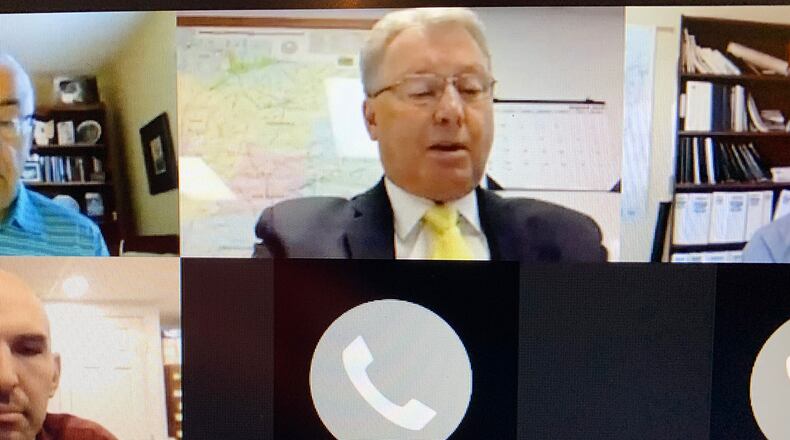“Our members were just were not ready for it. They weren’t up on that push here in Ohio,” said Brian Martin, MVRPC’s executive director.
“Obviously, I wanted the first one to pass, but I think we have a better resolution and it’s been an opportunity to have a good dialogue with members,” he said.
The August resolution was modeled after ones adopted by others in the region that declared racism a public health crisis that negatively affects well-being and leads to disparate outcomes in many areas of life. The city of Dayton, Montgomery County, Piqua, Trotwood, Yellow Springs and other institutions like Sinclair College, the University of Dayton and the Dayton Area Chamber of Commerce have approved such measures.
Ohio Gov. Mike DeWine’s task force examining the impact of coronavirus on minority communities released a report Aug. 19 listing as its first recommendation that state and local governments “acknowledge racism as a public health crisis and commit to swift action to dismantle racism."
About two weeks earlier, the MVRPC voted 20-14 on Aug. 6 to table the initial resolution for 60 days after an initial motion by Greene County Commissioner Tom Koogler, according to amended meeting minutes.
Speaking then on behalf of a coalition of Greene County communities, Koogler called the resolution “an unnecessary and polarizing act rather than a unifying call for change.”
The coalition, which included Greene County, Beavercreek, Fairborn, Xenia and multiple townships, said while they supported current MVRPC equity initiatives, the first resolution appeared on the agenda without time for discussion and cast questions over whether MVRPC was overstepping its bounds.
“My issue is — and I think a lot of people’s issue is — actually: stay in your lane,” said Steve Ross, a Bath Twp. trustee in Greene County. “MVRPC needs to focus on the roads and the infrastructure and maintaining the flow of traffic … Why do we want to turn it into a political organization?”
Koogler said MVRPC should address all forms of inequality through its proper sphere of influence, which is primarily through its planning and transportation functions.
The Greene County coalition was also concerned that the initial resolution wasn’t clear in its “intent regarding funding standards, procurement protocols or general policies,” Koogler said in his statement.
MVRPC is a metropolitan planning commission that makes state transportation policy and funding decisions for Greene, Miami, Montgomery and Preble counties as well as a portion of northern Warren County. The commission also offers regional and environmental support for members in seven counties.
Martin said the original resolution may have caused confusion, but didn’t mandate that local jurisdictions had to adopt their own racism as health crisis statement.
“A lot of folks think because MVRPC allocates funding, that will require communities to have adopted this sort of resolution,” he said. “That was not our intention nor implied at all.”
The resolution on the agenda Thursday calls for ensuring equity, diversity and inclusion in all actions by the board of directors, committees and staff, but makes no mention of racism as a public health crisis.
The August resolution would also have authorized Martin to work with public health agencies to address health and wellness issues faced by residents, a function opposed by the Greene County jurisdictions.
“We cannot support the current effort to intermingle regional planning with public health policy, even for the noble intent of fighting racism,” Koogler said.
Martin said Wednesday that MVRPC is not a public health department but the resolution up for a vote today will advocate for equity and wellness.
“We will work with our health departments to make sure that active transportation is still a part of the solution as it relates to wellness and with racism matters, diversity and inclusion matters,” he said. “That’s still in there. It’s just that we dropped it (racism as a public health emergency) from the title.”
Fairborn Mayor Paul Keller said one reason he voted to table the initial resolution was the lack of time to discuss the issues with fellow councilmembers, who themselves had approved a statement of diversity and anti-discrimination in June.
Keller said he supports the updated resolution and anticipates others will when voted on today.
“It’s been rewritten. I think it’s a stronger resolution,” he said. “I think it’ll pass by a tremendous vote.”
About the Author

